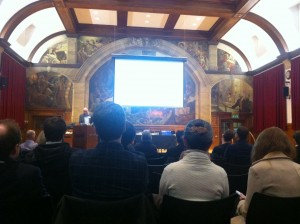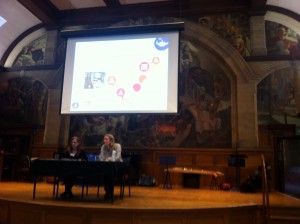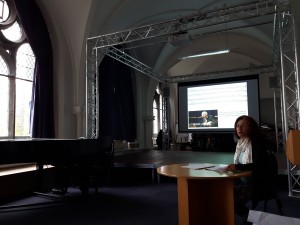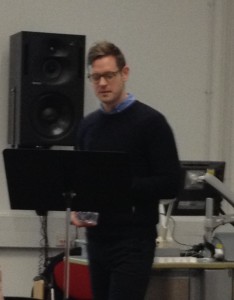The 49th Annual Music Research Students’ Conference took place in Prifysgol, Bangor University (Wales), from 6th to 8th January 2016. Usually organised by the Royal Music Association, it was for the first time this year co-organised with the British Forum for Ethnomusicology. It gathered music students from all over the UK and from overseas.
The theme of the conference was ‘Disciplines in Dialogue: a multidisciplinary conference for students involved in all kinds of music research’ and papers explored the boundaries between musicologies of various kinds.
City University MA alumna Solène Heinzl and PhD student and Visiting Lecturer Stephen Wilford attended the conference on the 7th and 8th January respectively. Solène presented a paper on ‘The Impact of Technological Communication on Filmmaker-Composer Creative Collaboration’ and Stephen Wilford spoke about the potential of the Internet as a site for ethnomusicological fieldwork as part of the ‘Fieldwork Methods’ session.
The 7th January included two very informative careers and methodologies sessions: the first on ‘How to Get Published’, sponsored by the publisher Routledge; the second on ‘Post-PhD Careers Beyond Academia’. There was also an opportunity for students to express their needs and concerns during the ‘Open Discussion of Graduate Training Needs’. The day ended with a keynote presentation by Professor Keith Howard (SOAS, University of London) entitled ‘The Future of Our Musical Pasts’. Professor Howard considered convergences and divergences between ethnomusicology and musicology and asked whether these discussions were relevant today, stressing the importance of preserving and sustaining the future of our musical pasts.
The second day of the conference included a number of panels with students presenting papers on a range of topics. These included another City BMus and MA alumnus, Andrew Pace, whose presentation focused on the role of the guitar in Maltese ghana music. Andrew traced the historical development of acoustic guitars in the local Maltese music scene, examining both the evolving design of the instruments and their role in affording status to the musicians playing them. The day also included panels on ‘Current Issues in Music in Higher Education’ (convened by the National Association for Music in Higher Education) and ‘Fieldwork Methods’ (convened by the BFE). The conference concluded with a keynote presentation (in the form of the Jerome Roche Lecture) from Professor Nanette Nielson (University of Oslo). Professor Nielson’s paper examined issues of subjectivity in relation to the role of music in film, and discussed the ways in which music is able to shape the merging subjectivities of characters and spectators.
The conference was a great success, bringing together postgraduate students and scholars with a range of musical interests. The connections formed between RMA, BFE and NAMHE members and the productive discussions that these generated, should be applauded, and hopefully augur well for the future of such joint conferences.
Solene Heinzl and Stephen Wilford

Professor Keith Howard’s Keynote Presentation

Ruth Glasspool (Managing Editor, Visual Arts, Music and Theatre & Performance Journals, Routledge, Left) and Professor Laura Tunbridge (Editor, Journal of the Royal Music Association, Right) – session on ‘How to Get Published’


 On 9 March the research seminar welcomed Tom Perchard from
On 9 March the research seminar welcomed Tom Perchard from 

